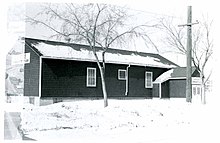Mary Dunn (sports executive)
[1] She grew up on the family farm southeast of the village of Roland as the youngest of two daughters to Robert and Annie Armitage who had English heritage.
[5] She played as a centre on the Manitoba Bisons women's ice hockey team,[6] and scored the winning goal in a 1926 Banff Winter Carnival semi-final game versus the Vancouver Amazons.
[8] Armitage graduated from the University of Manitoba with a Bachelor of Science and later married Jimmy Dunn, a sports executive from Winnipeg.
[10] The Manitoba championships were realized as a two-person effort co-ordinated by Dunn and Edith McKenzie at Sargent Park in Winnipeg.
[11] Dunn also served as an on-field timing and scoring official for track and field events at municipal and provincial competitions.
[12] Dunn co-ordinated fundraising efforts to send Manitoba's best track and field athletes to London, Ontario, for the Canadian national team trials in advance of the 1934 British Empire Games.
[15] She later served as president of the Winnipeg Branch of the WAAF of C for one season, and focused her efforts on basketball, softball, and track and field.
[16][17] The Great Depression and World War II led to the end of the WAAF of C, but Vince Leah wrote in The Winnipeg Tribune that Dunn was one of the association's more aggressive officials and was not to blame for its demise.
[21][22] Dunn attended the WAAF of C general meeting in November 1938, and her application for the DWAHA to affiliate was approved after two seasons without such an agreement.
[23] At the same meeting, she supported the Ladies Ontario Hockey Association who threatened to withdraw if not given an increased number of votes based on proportional representation of registered members.




